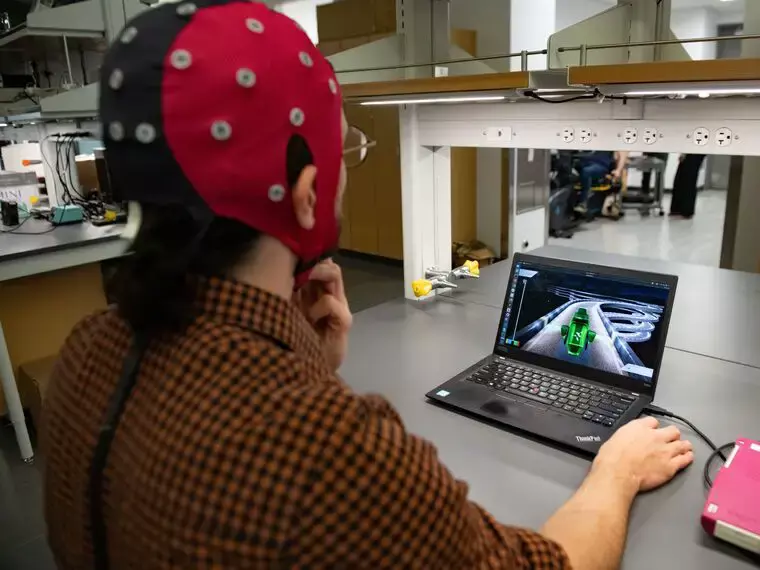In a groundbreaking development, engineers at the University of Texas at Austin recently unveiled a universal brain-computer interface (BCI) technology that allows individuals to control video games solely with their minds.
This innovative advancement could represent a leap forward in the scientific quest to harness the brain’s potential, possibly revolutionizing how we interact with digital devices and offering new horizons for individuals with motor disabilities.
The core of this new brain-computer interface breakthrough lies in its unique ability to bypass extensive calibration, which has long hampered the mainstream adoption of BCI technologies. Traditional interfaces must consider individuals’ unique neural patterns, thereby demanding that the devices be custom-tuned for each user.
However, researchers say they’ve developed a “one-size-fits-all” system that uses machine learning to dynamically adapt to users’ needs. The result is a seamless experience and a universal brain-computer interface that can shift from one person to another without the cumbersome need for recalibration.
“When we think about this in a clinical setting, this technology will make it so we won’t need a specialized team to do this calibration process, which is long and tedious,” Satyam Kumar, a UT graduate student and study co-author, said in a press release. “It will be much faster to move from patient to patient.”
The device uses a cap filled with electrodes to measure electrical signals in the brain. A sophisticated machine learning decoder then translates a user’s neural activity into game actions. Whether navigating the twists and turns of a racing game or balancing a digital bar, researchers say the interface learns and self-calibrates through repetition, making it a universally applicable solution.
Researchers demonstrated their novel universal brain-computer interface by having 18 test subjects play a car racing game similar to Mario Kart. Donning the cap filled with electrodes, participants successfully navigated complex courses using nothing but thought. Study findings were recently published in the journal PNAS Nexus.
At the South by Southwest Conference in Austin, Texas, from March 8 to 16, researchers showcased the broader potential of the new universal brain-computer interface. During the conference, volunteers quickly learned to control hand and arm rehabilitation robots using only their thoughts and the interface, demonstrating its versatility and user-friendliness.
The universal BCI technology developed by the UT team represents a significant shift away from other BCI technologies, such as Neuralink. Notably, Neuralink made headlines when a 29-year-old man who is paralyzed used their implant to post a tweet on the social media platform X by just thinking about it.
Although significant, BCI developments like Neuralink necessitate tailored calibration for each user and involve invasive methods, like the surgical insertion of computer components into the brain.
In contrast, the UT team’s non-invasive, non-invasive, and universally adaptable brain-computer interface marks a significant step forward in making BCI technologies more accessible and easy to use. This innovation could pave the way for future widespread commercial use of brain-computer interfaces.
Additionally, the significance of recent advancements in brain-computer interfaces extends beyond the immediate application of BCI technologies. Neural interfaces, like the one developed at UT Austin or Neuralink, are at the forefront of exploring neural plasticity—the brain’s ability to reorganize itself by forming new neural connections.
Research exploring the intricacies of the mind through machine learning and BCIs could ultimately expand our scientific understanding of the brain, including shedding light on the mystery of how consciousness interacts with the physical world.
The initial trials of the new universal brain-computer interface (BCI) technology were conducted with participants who did not have disabilities. However, developers say that upcoming research will expand to include larger groups in clinical settings, specifically testing the technology on individuals with motor impairments.
In a statement, Dr. José del R. Millán, co-author and professor of Neurology at UT at Austin, emphasized the dual goal of aiding those with disabilities and advancing the interface’s ease of use to maximize its impact.
“On the one hand, we want to translate the BCI to the clinical realm to help people with disabilities,” Dr. Millán explained. “On the other, we need to improve our technology to make it easier to use so that the impact for these people with disabilities is stronger.”
“The point of this technology is to help people, help them in their everyday lives,” Dr. Millán added. “We’ll continue down this path wherever it takes us in the pursuit of helping people.”
Tim McMillan is a retired law enforcement executive, investigative reporter and co-founder of The Debrief. His writing typically focuses on defense, national security, the Intelligence Community and topics related to psychology. You can follow Tim on Twitter: @LtTimMcMillan. Tim can be reached by email: tim@thedebrief.org or through encrypted email: LtTimMcMillan@protonmail.com

